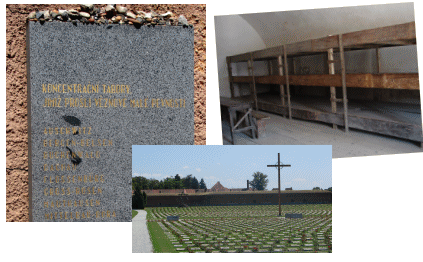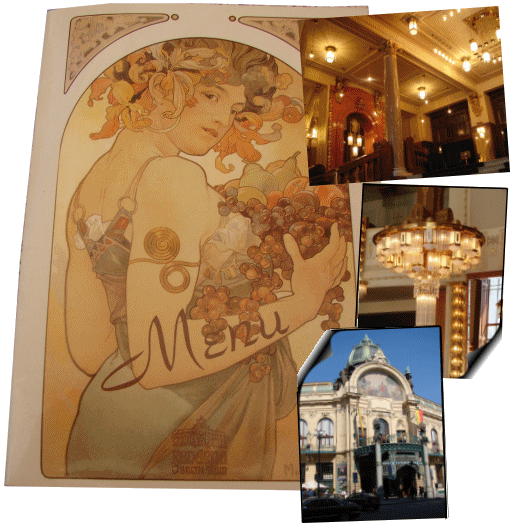The river cruise up the Danube from Budapest to Linz, Austria was relaxing. The political turmoil I periodically felt in Hungary was mostly left behind and I enjoyed the beauty and culture of the cities along the way – particularly Vienna – a place I knew a lot about from years of teaching the Freud Course in our Psychoanalytic Institute. I’d been there 35 years ago, but Vienna has enough top keep one occupied for many visits. And who could ever tire of the coffee and pastries there? Not I. Then we moved on to Prague, and the history began to again color my thoughts. Prague was also part of the Austrio-Hungarian Empire. When World War II was brewing, Prague and the Czech Republic were in the center of things. There was greater ethnic diversity in the Czech Republic than Hungary. There’s a part of the Czech Republic, Sudetenland, that had a lot of German speaking people. This is the part that Hitler got in the infamous "Munich Treason" in 1938. In 1939, Hilter occupied the rest of the Czech Republic. Unlike Slovakia which had its own Nazi Party, the Czech Republic was taken over by the German Nazis.
After the War, the Czech Republic and Slovakia were joined as a short-lived Republic that was taken over by their Communist Party in 1948. During the post-war period, 2.7 million people of German extraction were deported from the Sudetenland. After years of repressive Communism, Alexander Dubcek tried to "put a human face on Communism" during the 1968 "Prague Spring," but his efforts ended when half a million Warsaw Pact soldiers invaded the country. They call the fall of Communism in 1989 the "velvet revolution."
We visited a town North of Prague, Terezin [Theresenstadt] which had a unique and unsettling story.

As you can see, it was an old fortified city with a nearby walled garrison built in the end of the eighteenth century as a fortification against the Prussians. It was never used for that [the Prussians went around it]. In 1941, the Germans emptied it of its inhabitants and turned it into a Jewish Ghetto. It was portrayed as a model place where the Jews were segregated. There’s a movie made by the Nazis shown at the musuem that shows smiling people wandering the streets, giving concerts, playing soccer. The reality – it was a place where 33,000 people died from neglect, disease, or were executed. Another 88,000 were sent on to die in the Extermination Camps, and only 19,000 survived the War. It was a grim place:

But the most disturbing thing there was not the prison itself. It was a museum filled with art, and recorded concerts, and photographs of the people who lived and perished there – "putting a human face" on the Holocaust.
Even more than Budapest, Prague is a vibrant European city filled with Castles, Cathedrals, and antiquities. Art Nouveau flourished there under Alfons Mucha and is well represented in the Architecture and public buildings.


Like Budapest, the wonderful sights and sounds of Prague, the spires and buildings, show little evidence of the twentieth century having even happened. Another place. Another couple of lost generations. A historic Jewish Quarter with very few Jews [the ones that survived didn’t come back. Who would?].
I loved Eastern Europe, the people we met, the food, the tourist sites, and even the feel of the streets. But the background of a missed century was rarely far from my mind. Again, I found myself sitting on park benches with a vague sense of tragedy. People in high places getting lost in their own ideas messing with people’s lives. Suicide bombers and American soldiers seemed as present as the ghosts of the Holocaust, the Nazis, the Stalinists. I even thought of the Cherokees who lived in my home in Georgia marched on the Trail of Tears by the settlers, much as they’d driven out the Creeks who were there before. Human beings in groups are capable of doing some pretty horrible things.
When it’s all said and done, the twentieth century in Eastern Europe may not have been so different from what came before – as the various empires swept back and forth across Europe. It may be the experience nearness of the last century that made their twentieth century so pointlessly tragic to me. After all, even "Good King Wenceslaus" was hacked to death by his brother back in the tenth century. But, listening to all the talk of Executive Privilege and War on coming home had a more ominous aura. I keep thinking that we should know how inconsequential contemporary power politics is in the scope of history – how much such things do to the lives of everyday people. According to Hegel, the point of our history is civilization, and he naively thought we were at the end of history. What Eastern Europe said to me was that we sure aren’t there yet. And the process of getting on an airplane said it too. And my newspapers here say it. Hegel’s civilization seems nearly as elusive today as it must have to the Magyars and Slaves that migrated into Eastern Europe at the dawn of the last Millenium.
And it’s not lost on any of us that it is attempts to solve things that cause the problems. The Nazis were out to build a society that endured; same thing with Communism; same thing with the naive Bush Doctrine, spreading Democracy [by destroying it]; same thing with the jihadists. It’s like the race to get to the end of history is what keeps us from getting there. Global warming sits on our shoulder right now screaming that we’d better get our act together or the planet is going to be taken over by tropical plants and cockroaches, and all of us are just going to be the forgotten memories, our molecules floating in the oil-fields of some unknown future.
On another note, Eastern Europe is as much a melting pot as America is. There were Czech-speaking asians hippies on to Metro. Our guide in Terezin was a Phillipean woman who’d met her Czech husband in Prague as a tourist. We met lots of all kinds of people, and it took very little time to find a commonality. I’ve already written about our amazing encounter with a Czech lady in the Metro who told us her life story and of her own lost generation. In a shrinking world, it’s harder and harder to depersonalize other people. I just hope we all get to know each other in time…
I think I’ve found a new American hero to help us remember that there are people who know right from wrong and speak out when they see wrong with little regard for themselves. He’s a lawyer and his name is Stephen Abraham and his story is in the NYTimes. He was a military man who was assigned to work in the special court set up for enemy combatants that are being held in Guantanamo Bay. He is going to testify in a Congressional hearing July 26 pertaining to the judicial system that Bush calls a special court for the terrorists. He had the nerve to question the evidence used to try the prisoners in the prison. Lt Col. Abraham is a very brave and honorable man. His biography helps to explains why.